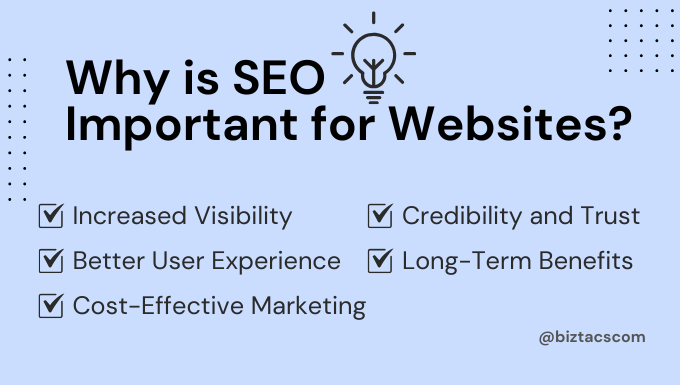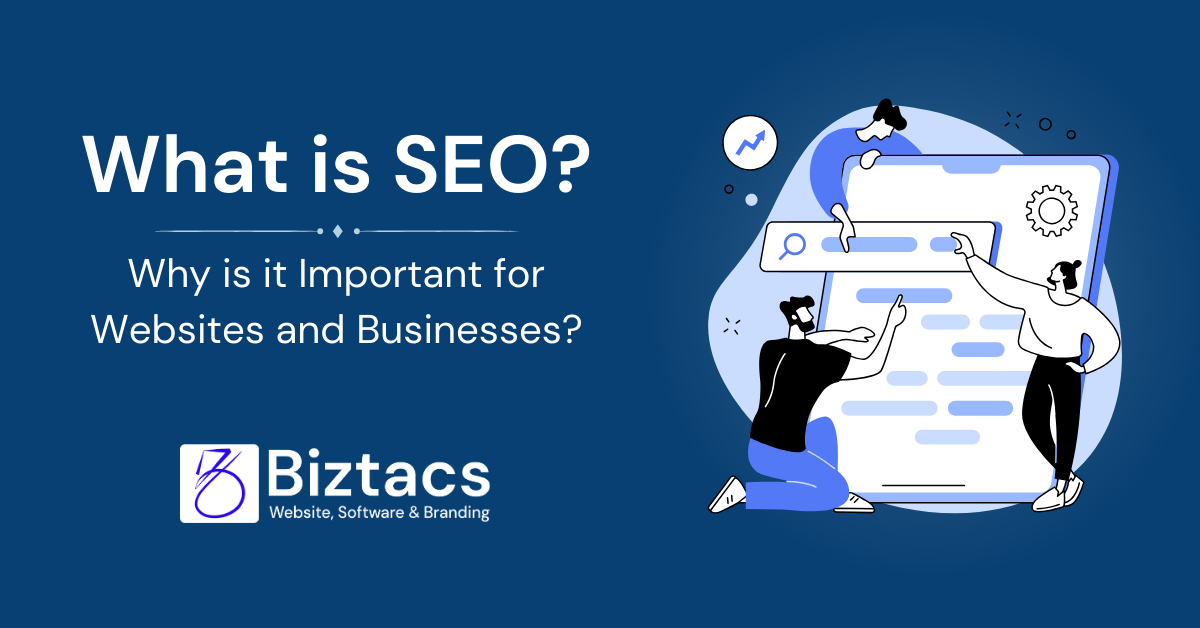Search Engine Optimization (SEO) is the process of optimizing a website to improve its visibility on search engines like Google, Bing, and Yahoo. The primary goal of SEO is to increase organic (non-paid) traffic by ensuring that the website ranks higher in search engine results pages (SERPs) for relevant keywords and phrases. SEO is important for websites and businesses because it not only increases traffic but also improves the overall online presence and credibility.
What is SEO?
SEO involves multiple strategies and techniques designed to improve a website’s performance on search engines. It consists of several key components:
- On-Page SEO: This refers to optimizing individual pages of a website. It includes keyword research, optimizing titles, meta descriptions, headings, content, and images to ensure search engines can easily understand and rank the pages.
- Off-Page SEO: This focuses on building the website’s authority by earning backlinks from reputed websites. Backlinks are like votes of confidence from other sites, signalling to search engines that your content is valuable.
- Technical SEO: This deals with optimizing the technical aspects of a website, such as site speed, and mobile responsiveness, and ensuring that the website is accessible to search engine crawlers.
- Content: High-quality, relevant content is the foundation of any successful SEO strategy. Content needs to be informative, engaging, and tailored to users’ needs while including relevant keywords.
- User Experience (UX): Search engines prioritize websites that offer a positive user experience, including fast loading times, easy navigation, and mobile optimization.
Why is SEO Important for Websites?
SEO is important for websites for several reasons:
- Increased Visibility: The primary goal of SEO is to help a website appear on the first page of search engine results, as users rarely look beyond the first few results. Higher visibility leads to increased organic traffic.
- Credibility and Trust: Websites that rank higher in search results are often perceived as more credible and trustworthy. Search engines like Google consider numerous factors when ranking websites, including the quality of content, user engagement, and domain authority.
- Cost-Effective Marketing: SEO is one of the most cost-effective digital marketing techniques. Unlike paid advertising, where traffic stops once the budget runs out, SEO generates steady traffic over time without continuous investment.
- Better User Experience: A strong SEO strategy usually involves optimizing the website for user experience. A website that is fast, easy to navigate, and mobile-friendly will not only rank better but also provide a good experience for users.
- Long-Term Benefits: SEO is a long-term strategy. While it may take time to see significant results, once the website starts ranking, it can maintain its position with consistent optimization and content updates.
Why is SEO Important for Businesses?
For businesses, SEO plays a key role in attracting and converting potential customers:
- Increased Sales and Revenue: Higher visibility and traffic mean more opportunities to convert visitors into customers. SEO helps businesses reach their target audience at the right moment, increasing the chances of conversion.
- Competitive Advantage: Many businesses are investing in SEO. Those that do not risk falling behind their competitors. A well-optimized website can give a business an edge over competitors who may not be prioritizing SEO.
- Local SEO for Local Businesses: For businesses operating locally, SEO is important for capturing local search traffic. Local SEO focuses on optimizing a business’s online presence to attract customers from nearby areas. Appearing in local search results and Google Maps can significantly boost foot traffic and sales for businesses.
- Brand Awareness: Ranking at the top of search results increases brand awareness. Even if users do not click on the site immediately, repeated exposure builds recognition and trust over time.
- Adaptability to Changing Trends: SEO allows businesses to stay adaptable in the fast-paced digital landscape. Search engine algorithms evolve, and businesses that implement strong SEO strategies can quickly adapt to these changes.

Balancing Factors in SEO Strategy
While SEO is highly beneficial, it’s essential to balance various factors to achieve optimal results. A few trade-offs include:
- Quality vs. Quantity of Content: While it’s important to create a large volume of content to rank for different keywords, the quality of content is equally important. High-quality content that provides value to the user will perform better in the long run.
- Long-Term Investment vs. Immediate Results: SEO is a long-term strategy, and businesses may not see immediate results. However, investing in SEO now can pay off greatly over time as rankings improve and traffic increases.
- User Experience vs. Optimization: Sometimes, overly optimizing a website with too many keywords can negatively impact the user experience. It is important to balance between user-friendly design and effective optimization is key to maintaining both rankings and user engagement.
Challenges in Implementing SEO
SEO is not without its challenges. First, search engine algorithms are continuously changing, making it difficult for businesses to keep up with the latest best practices. Additionally, SEO requires ongoing effort in content creation, backlink building, and technical updates.
Another challenge is the increasing competition across many industries. As more businesses recognize the importance of SEO, it becomes more difficult to stand out in crowded markets. This makes it crucial for businesses to implement well-researched, creative, and adaptive SEO strategies.
Conclusion
SEO is essential for any website or business looking to grow its online presence, attract more visitors, and drive conversions. By optimizing websites for search engines and providing high-quality, valuable content, businesses can improve their rankings, build credibility, and stay competitive in today’s digital landscape. SEO is a long-term investment with lasting benefits, making it a critical component of any marketing strategy.
